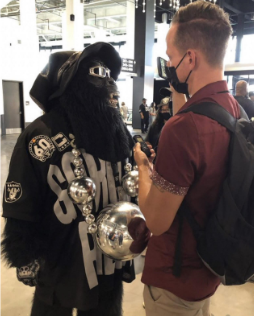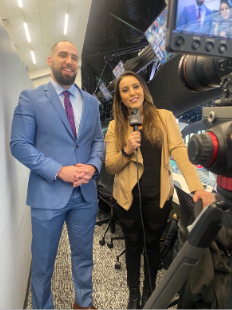
Columnist Day

Column writers play a vital role in our world, sharing commentary and opinions on everything from politics to pop culture. If you like discovering novel stories and writing, becoming a columnist may be a perfect career path for you to pursue. And, with the growth of social media, the way that people absorb information has largely changed from reading printed media to scrolling on various online platforms. Meaning that columnists nowadays are not confined by traditional media as they become more online-oriented.
This year, Columnist Day falls on April 18th, and the best way to celebrate the day is to read a newspaper column and showing some love to local columnists.
To better understand what a columnist’s job entails, I interviewed two local columnists working at the Las Vegas Review-Journal. They shared their experiences of writing as professional columnists and how students should prepare for their future careers if they are passionate about working in the journalism industry.
Working As a Reporter and Columnist at the Same Time

Mick Akers, a reporter and columnist working in the sports business and the transportation field, has worked in journalism for nine years. When asked about his first time realizing his passion for writing and reporting, Akers said, “I started out wanting to be a reporter. My role as a columnist came along when I was hired in 2018 as the Review-Journal’s transportation reporter. It was basically a package deal.”
Discovering His Passion For Writing
Akers went on to say that he’s always liked writing and that he found writing essays and reports came naturally to him while in school.
“I’d usually wait until the last minute and write them the night before and still get “As” for the most part,” he said. “So, once I figured out that I wanted to get into journalism after high school ended, I pursued that. Procrastinating on all those assignments helped me to handle ever-ending deadlines, too.”
Akers found his passion in writing while in college. His first published article appeared in CSN’s student newspaper. When asked about his feelings about seeing his name published for the first time, Akers said that despite it just being the school paper, it was an important moment for him.
“That feeling doesn’t really get old to this day,” he said. “My first column being posted was similar, except that my photo is included with my byline. So, that was the first time after several years of writing that my photo accompanied my writing.”
Loving What He Does
Thoroughly enjoying his profession, Akers shared that working simultaneously as a reporter and a columnist doesn’t burden him. While working as a reporter, he writes his news stories more by the book and with the standard news style. When writing as a columnist, he has a little more fun as he can inject his personality into his articles.
Moreover, despite its inherent challenges, Akers reports not disliking anything about working as a columnist. And, gathering credible and reliable sources is one of the most challenging things a columnist faces. After you’ve worked in the industry for a while though, you gradually develop and build a list of connections while improving your communication skills.
“Early on in my career, finding the right sources was stressful. You’re only as good as the information you can report,” he explained. “So, once I developed a deep sourcing pool, it helped out my stories and removed the main stressor.”
Although deadlines and the 24-hour news cycle are grueling sometimes, Akers never feels bored or tired of it. “The chase of breaking a big story is also a thrilling part of the job,” he said. “You also get instant gratification when your story posts and you start to get reader feedback. So, I plan to stay in the industry for a very long time.”
Akers’ Suggestions For Future Columnists and Reporters
For students interested in pursuing a career as professional columnists, Akers suggested they acquired as much experience as possible.
“I started wanting to be a sports reporter. My first internship was covering Triple-A baseball,” he said. “But my first real job was as a general-purpose reporter. I covered all the beats at my first gig from government, transportation, sports, education, healthcare, and business.”
He added that improving one’s ability to cover a diverse range of topics helps with writing any singular beat they might write for.
“You’ll be surprised how much you learn from one beat will help you in another, unrelated beat. After working all the different beats, I ended up as a sports business reporter in addition to my transportation beat and column,” he said. So, it kind of came full circle to my goal of wanting to be in sports. Once you’ve proved yourself as a reporter, becoming a columnist is a smooth process, especially if it is for a topic you’re well-versed in.”
(Article continues after ad)
Please follow our amazing sponsor!
Prerequisites of Being a Columnist

Sam Gordon, another columnist working in the sports field, listed some prerequisites for students to look at if they want to pursue their career in journalism.
“You have to read a lot, write a lot, and be willing to make connections!” he said. “I write almost [six] days a week, and I read different styles of writing. It requires a lot of practice if you want to be a successful columnist.”
How Gordon Got His Start
A graduate of the University of Minnesota, Gordon developed his interest in writing and reporting while in college. During his senior year, Gordon worked in the student newspaper as a student columnist. He gathered opinions from students on different issues and he wrote about sports events. One of his most unforgettable experiences was writing about the 2011 UMN swimming league–his first time seeing his name printed in the newspaper.

When asked about his favorite thing about being a columnist, Gordon said, “It’s a job letting you be creative and fun. It is entertaining and rewarding to finish an article. I also enjoy expressing myself through writing and language.”
Gordon’s Advice For Future Columnists and Reporters
Finding sources is overwhelming sometimes, especially with deadlines around the corner. Gordon shared his experience of reaching out to sources.
“Sometimes people just don’t get back to you,” he said.” Making connections is hard and some people won’t talk to you if they do not know who you are. The only thing I can do is to adapt it and to keep finding other credible sources to enrich my articles.”
Stepping Into The Industry
Despite the deadlines and possibility of rejection by potential interviewees, Akers and Gordon are passionate about their professions as columnists. It’s clear that they both love what they do. And that passion is something one must have to be successful in the journalism industry. Being genuine, sincere, and professional in your writing are the core qualities of a columnist. For those who hold these qualities, don’t hesitate to reach out to career advisors in your school and start preparing for your future path into journalism by reading, writing, and building more connections!



